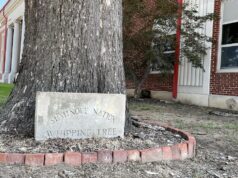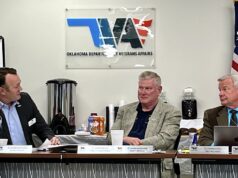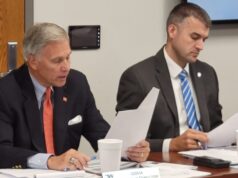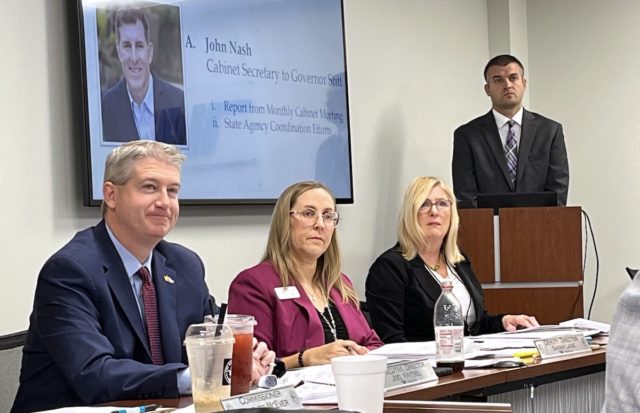

An awkward moment 44 minutes into the Sept. 1 Oklahoma Veterans Commission meeting previewed an explosive exchange hours later and underscored the long-brewing tension between Department of Veterans Affairs director Joel Kintsel and Gov. Kevin Stitt’s secretary of veterans affairs and military, John Nash.
As Kintsel and his staff were updating commissioners about a planned cognitive care facility for Oklahoma veterans dealing with mental health and dementia issues, Nash spoke up from his seat wedged among media and legislators in the audience.
“Can I ask a question?” Nash queried.
Kintsel froze, looking at Nash and then turning to his agency’s legal counsel, Kim Heaton. Kintsel whispered his question to Heaton, who seemed puzzled and then cautious in her response, which she directed to Nash: “I would assume you can ask a question, if you would like.”
Nash’s question and Kintsel’s subsequent answer were innocuous, but the strained interaction pointed to the elephant in the room: Concern that Kintsel’s criticisms of and failed Republican primary campaign against Stitt have made him a target for termination by the governor, who has installed five new members of the Veterans Commission over the past three months.
“In a commission-led agency like this one, the secretary plays no operational role whatsoever,” Kintsel told NonDoc days prior to the Sept. 1 meeting. “So [Nash] has been trying to — I believe — undermine me with my own staff. He wants to talk to them. They are trying to glean information to use in order to terminate my employment.”
But after a lengthy executive session during their five-hour Sept. 1 meeting, Veterans Commission members took no action on Kintsel’s employment and, instead, emerged with a message reminding both Kintsel and Nash to focus on the ODVA’s mission of serving Oklahoma veterans.
“That’s why we had the meeting today,” said Jerry Ball, a longtime commission member. “Unite, get off the horse, bury the hatchets. Let’s go. Do the work.”
Kintsel: ‘Retaliation on the part of the governor’
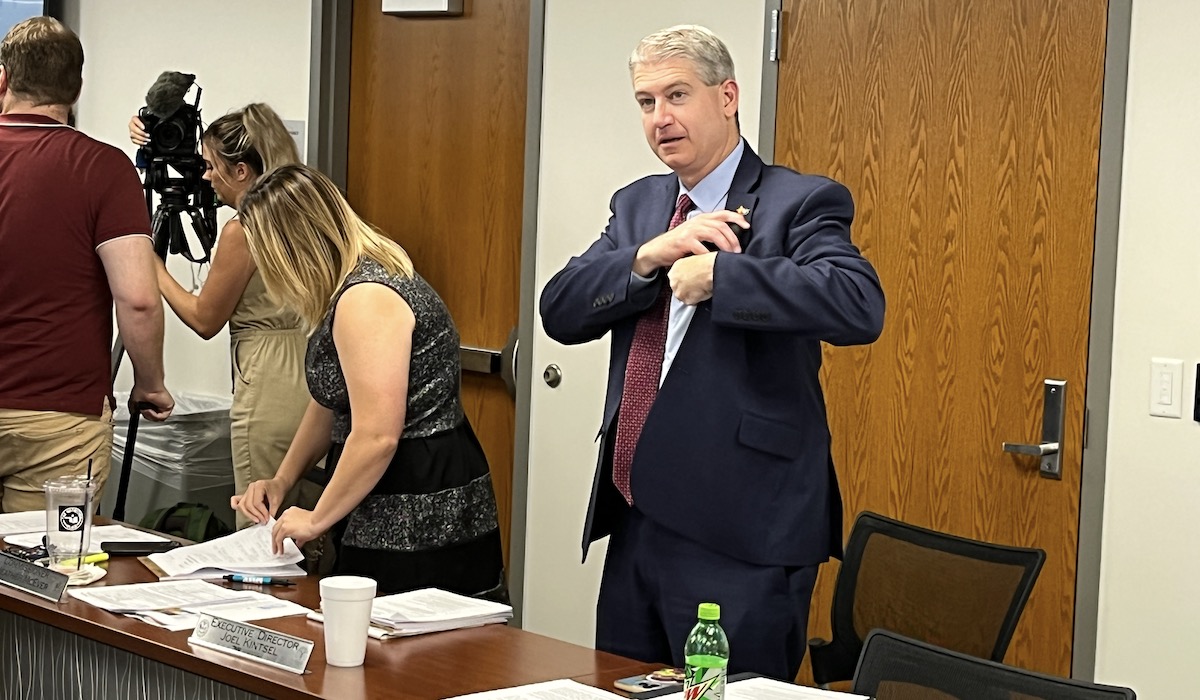
Whether Joel Kintsel or John Nash unholstered his hatchet first is a matter of dispute, but in the weeks leading up to the Sept. 1 meeting, Kintsel had been brandishing his more publicly.
On Aug. 23, Kintsel sent an email to Veterans Commission members and Oklahoma legislators proclaiming a “serious problem developing” at ODVA:
We have now gone for more than two weeks without having any of our pending expenditure requests signed by the secretary of military and veterans affairs. On Aug. 5, in the course of a nearly three-hour discussion, the secretary declined to sign any of the requests in question but committed to coming back by the agency the following Monday, Aug. 8, to sign the expenditure authorizations. To date, this has not occurred. If this situation persists, we will soon be unable to provide the basic supplies and resources needed to operate the agency and specifically, to provide for the veterans under our care in the seven veterans homes. Please note that this is happening as a consequence of my decision to run for governor and is clearly intended as retaliation on the part of the governor through his agent, the secretary of military and veterans affairs, Jonathan Nash.
Kintsel’s email was reported by Barbara Hoberock of the Tulsa World, and the story circulated among commissioners, legislators and members of the Stitt administration.
When the Sept. 1 meeting’s agenda posted, it included an executive session item regarding the employment of Kintsel as director. Nearly a dozen news outlets attended the meeting, as did four veterans serving in the Oklahoma Legislature: Rep. Josh West (R-Grove), Rep. Tommy Hardin (R-Madill), Rep. Jay Steagall (R-Yukon) and Sen. Shane Jett (R-Shawnee).
“I came down because I’d seen the agenda like a lot of people did,” said West, who woke up at 4 a.m. to make the meeting and exercised his legislative authority to sit in on the executive sessions.
Nash: ‘I confused a nonpartisan issue with a nonpolitical issue’
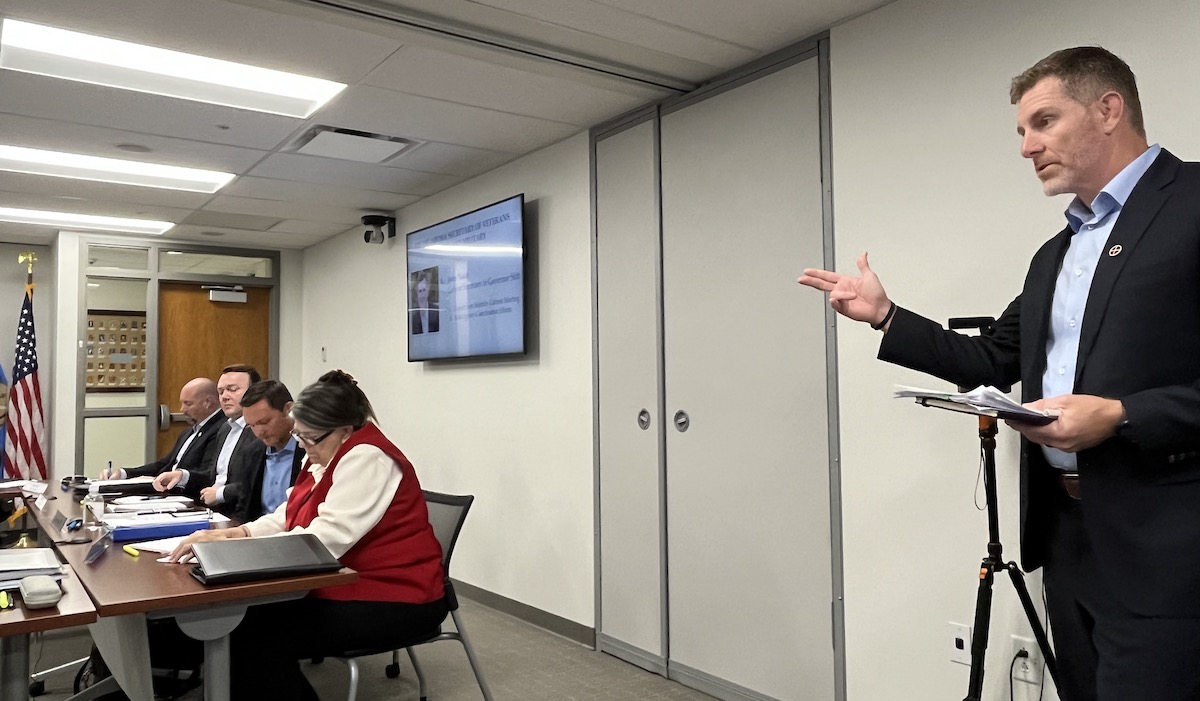
In an interview two days prior to the Sept. 1 commission meeting, Nash said Kintsel’s Aug. 23 email to commissioners and legislators did not accurately reflect the situation and that he has not been looking for excuses to have Kintsel fired.
Instead, Nash said he has been trying to learn more about agency operations and has been focused on convincing Kintsel to put ODVA through a new “optimization process” that the Office of Management and Enterprise Services has been leading for state agencies. (The process has spurred budgetary efficiencies that have created pay raises for employees of the Department of Human Services and Department of Corrections without layoffs, Nash said.)
“When accepting the role [of secretary of veterans and military], I confused a nonpartisan issue with a nonpolitical issue,” Nash said. “I thought that serving veterans was an American thing, not a Republican thing or a Democrat thing — that it’s an American thing and an Oklahoma thing. I thought, Pollyannaishly, that, ‘Hey, this is going to be something where I can work across the aisle and there can be broad support. And therefore it’s not going to be political.’ Well, I was wrong.”
Stitt appointed Nash to the cabinet secretary position, which acts as a liaison to ODVA, on March 28. Questions about a portion of Nash’s military service — which Nash and West said Nash does not have clearance to discuss publicly — drew criticism from some members of the Oklahoma Legislature’s Veterans Caucus, but the State Senate narrowly confirmed Nash for the position May 20 on a 28-15 vote. (Nash allowed NonDoc to review documents that state he was honorably discharged after his military service.)
Between Nash’s March 28 appointment and his May 20 confirmation, Kintsel had announced his campaign for governor, which he kicked off with a press conference laced with criticism of Stitt as “corrupt.” Kintsel, a former Oklahoma House parliamentarian whom legislators recommended for the ODVA job owing to prior problems at the agency, pointed to “boards, buddies and backrooms” for evidence of Stitt’s malfeasance.
“If elected, my first priority will be to clean up the corruption and mismanagement left behind by the Stitt administration,” Kintsel said in the April 7 press release announcing his campaign. “We cannot allow Stitt and his buddies to continue enriching themselves at the taxpayer’s expense. Let’s stand together and set things right for Oklahoma. Let’s create a future where all Oklahomans have the opportunity to succeed and thrive.”
Nash, however, said he only learned of tension between Kintsel and the Stitt administration after accepting the governor’s appointment.
“I did not know Joel Kintsel. I did not know he was running for governor. As I started having conversations around the Capitol, it became very clear to me very quickly what the situation was,” Nash said. “But the governor didn’t tell me — I don’t know that the governor has ever said Joel Kintsel’s name to me. I could not testify to it in court. I can’t remember him ever saying Joel Kintsel’s name. But there were plenty of representatives and senators — it was the worst kept secret at the Capitol that he was running for governor. I was obtuse to that because I didn’t come from a political background.”
Commissioner: ‘This is getting out of hand’
Tensions among Kintsel, Nash and others grew from April through August:
- In late April, Stitt announced three new appointments to fill expiring seats on the Veterans Commission, effective July 1. Meanwhile, the commission approved a leave of absence for Kintsel while he ran for governor;
- In late May, then-Veterans Commission Chairman Larry Van Schuyver and Vice Chairman Pete Costilow provided Reese Gorman of The Frontier a recording of their February conversation with Stitt chief of staff Bond Payne about Kintsel’s potential gubernatorial campaign;
- On Aug. 4, Stitt removed Van Schuyver and Costilow from the commission, replacing them with Robert Allen Jr. and Scott Sweeney, respectively. Stitt’s spokesperson called the audio recording “an egregious breach of trust”;
- The next day, on Aug. 5, Van Schuyver and Costilow sued Stitt in the Western U.S. District Court of Oklahoma, alleging that Payne and Nash had exerted undue influence regarding Kintsel’s employment and had violated their First Amendment rights;
- On Aug. 10, Van Schuyver joined four others and the Oklahoma Military Order of the Purple Heart in suing Allen — Van Schuyver’s replacement on the commission — in Oklahoma County District Court, saying that Allen was not qualified for the appointment because his name had not been submitted to Stitt by the organization as outlined in statute. (The Stitt administration filed a motion to dismiss Aug. 29, arguing that the organization has “no authority” to recommend names to the governor because it allegedly has not submitted annual audits as required by the same statute.)
Amid the turmoil and appointments of new members, the Veterans Commission did not meet in July, and its Aug. 5 meeting lacked a quorum. At that meeting, Kintsel asked Nash to provide his signature for approval of about $864,000 in requested non-emergency agency expenses, which he outlined to NonDoc by email:
- Payment for licensing medical and financial software used in the seven veterans centers: $558,284.36;
- Annual lease payment for use of OMES’ building for ODVA Central Office: $156,336;
- Tuition payments on behalf of ODVA employees for educational expenses related to their employment: $56,700;
- Payment for software licensing for vital signs equipment in the seven veterans centers: $35,280;
- Purchase of equipment for Ardmore Veterans Cemetery: $29,930;
- Expenses for final inspection of the Ardmore Veterans Cemetery construction project: $27,500.
Kintsel said he and ODVA’s legal counsel consider the executive order requiring secretary approval of non-emergency expenditures above $25,000 legally invalid. He also said he acknowledges that the approval delay for the proposed expenses had not created an immediate crisis, but he defended his email to commissioners and legislators.
“I felt like I had to start raising this before it turned into that,” Kintsel said prior to the Sept. 1 meeting. “It’s all mundane business that you do, but the fact is this is a really big agency and it starts accumulating quickly. (…) They’re obviously playing a game.”
The Sept. 1 meeting’s agenda included an item discussing the ODVA legal opinion that the executive order is invalid. During the discussion, Kintsel engaged in a lengthy and, at times, heated exchange with commissioners, the final 11 minutes of which were captured in the video embedded above. Sweeney and other commissioners debated their recollections of their conversation with Nash at the Aug. 5 meeting that lacked a quorum.
“He was here for several hours, and he did not stop and sign them that day. But he told me he would come back Monday and handle it,” Kintsel said. “What I have told him is if you want information, coordinate it through me. There’s never been any other message than that. That did not happen on Monday (Aug. 8). He was a no-show on Monday. Then I get an email a couple of days later saying if you give me access to your staff, then I will [sign].”
From the audience, Nash whispered: “That’s not true.”
Nash provided a copy of his Aug. 8 email to NonDoc. In it, he lists six “follow up actions” and four “new items.” The third item listed as follow up related to approval of the expenditures.
“Please let me know when I can meet with the appropriate staff to review the expense requests you may have for my signature,” Nash wrote.
In his Sept. 1 conversation with commissioners, Kintsel took issue with Nash’s statement.
“Under the law, the executive director administrates the agency. I’m not going to have the secretary get involved directly with the operational part of this,” Kintsel said. “If he has questions, I’m happy to answer those, but I’m not going to go a road like that. There are some boundaries that we need to observe, and that apparently has been a challenge.”
Sweeney, in his first commission meeting, asked Kintsel why he did not reach back out to Nash to get the funding requests approved prior to sending his email to legislators and commissioners two weeks later.
“Normally, that is what you would do. But in this situation, with the course of conduct that has occurred since Sec. Nash has been here, there is clearly political game-playing going on, and at some point, I’m not going to put up with that anymore,” Kintsel said.
Sweeney said he would behave differently if the obligation to meet agency needs were his responsibility.
“If it’s on me to get the money for that software, I don’t care if I’ve got to go sit in front of that guy’s door,” Sweeney said. “If that is what the process appears to be at that point prior to this memorandum and opinion, I’m going to go sit at the guy’s office. I’m going to go track him down, and I’ll going to hunt him down. I don’t care what it takes, because that’s the mission.”
Kintsel replied, eventually raising his voice during the exchange and asking Sweeney to “let me talk.”
“That’s not what is going on here. I’m not going to chase the secretary all over town trying to get a signature from him when it was right in front of him and he wouldn’t do it, and then the following workday he did not show up, even though he represented he would,” Kintsel said. “Commissioner, this is political. (…) What’s happening at this point is political retaliation. He has been sent over here by the governor to create a firestorm, which in turn will be blamed on me as the director.”
Moments later, Kintsel referenced politics directly after Sweeney asked whether they had met at a political fundraiser in Ada, Sweeney’s hometown.
“And you offered to do a fundraiser for me, and never called me back, and the next time I’ve seen you is right here doing this,” Kintsel said. “That’s the truth.”
Sweeney asked if he was “here as your opposition, or am I here because I am a veteran?”
Kintsel said he had “no idea.”
“I don’t know what discussions were made at the time of your appointment,” Kintsel said. “I hope you’re here to actually serve the veterans. I would assume that, and I hope so.”
Commissioner Jerletta Halford-Pandos, who had served on the commission previously and was appointed again by Stitt in April, broke up the verbal melee.
“This is getting out of hand,” she said.
The value of ‘face-to-face conversations’
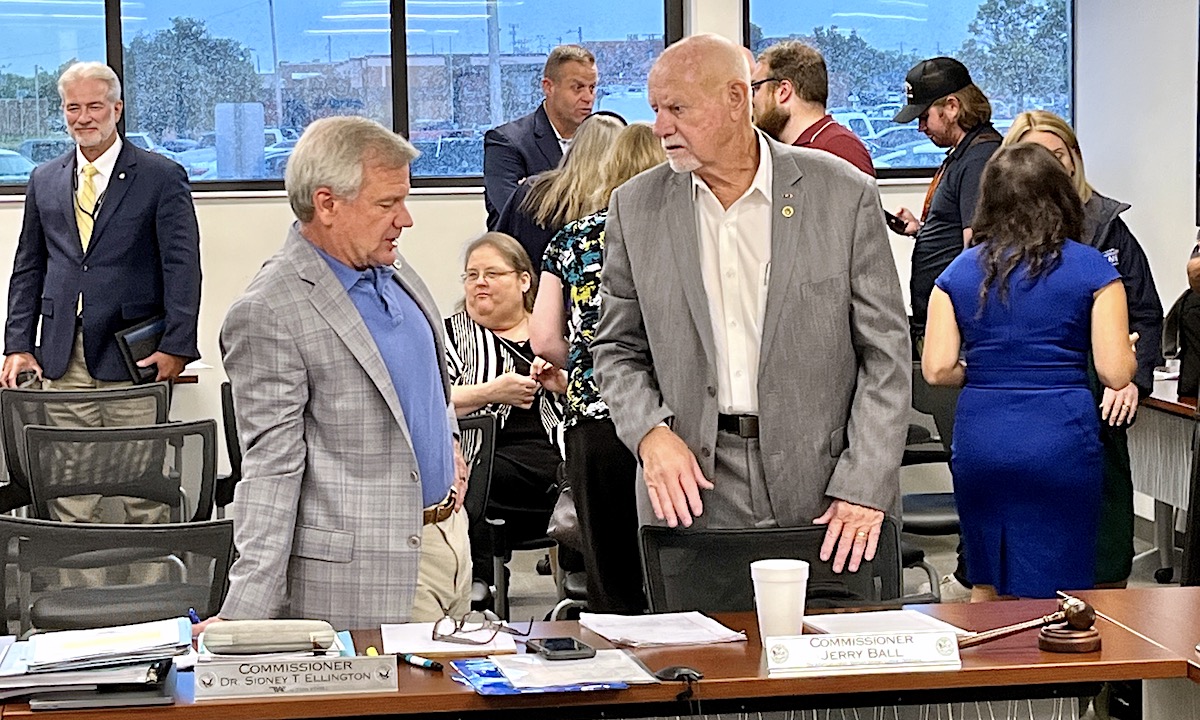
Following the heated exchange, the commission went into its second executive session of the day Sept. 1, which lasted about two hours. Nash waited in the agency’s lobby with media, while the lawmakers in attendance stayed in executive session to observe the commission and Kintsel. Nash eventually left to pick his children up from school. Moments later, a commissioner walked into the lobby looking for him to no avail.
When the commission returned to open session, no action was taken on Kintsel’s employment and the meeting concluded. Kintsel read a statement to NonDoc regarding what had been discussed behind closed doors.
“I am so proud of what we have accomplished together as Oklahoma veterans, and I look forward to what we will accomplish moving forward,” Kintsel sad. “As Oklahoma veterans, we stand unified as brothers and sisters.”
Asked if he and Nash were going to be able to get along, Kintsel replied: “Well, we’re veterans, and we’re going to work together.”
More than a week after the Sept. 1 meeting, Nash noted that he still has frustration about how Kintsel characterized his communications to commissioners, but he echoed the need to remain mission-focused.
“My mission is and always has been to work at every level with ODVA to ensure that we are delivering best-in-class services and support to the veterans in Oklahoma. Period,” Nash said. “That’s it, that’s the goal. I’ll work with any stakeholder anytime, anywhere to get that done.”
Veterans commissioners appeared satisfied that their private message to Kintsel had allayed his fears about his job and returned focus to the agency’s mission. Asked about the dispute between Kintsel and Nash, Halford-Pandos said she “wouldn’t know” about it, despite her efforts to lower the room’s temperature hours prior.
“Our mission is the veterans in Oklahoma,” she said.
Allen, who was attending his first meeting as commissioner, said the executive session proved fruitful.
“I have a much better feeling that everybody is on the same page and we see more positivity going forward,” Allen said. “I think there was a lot of misconceptions on multiple parties that got cleared up.”
Ball, who was elected chairman of the commission after executive session, agreed.
“I don’t know what their dispute was about. We’re not going to go there. This is part of our healing process — that I’m not going there,” Ball said. “Everybody now knows what their jobs are. We know where to go now, and our commission is now united. I think all questions have been removed, and I think from now on until the next confrontation comes up, we’re all on the same page.”
West, who observed the discussion as a legislator, acknowledged that the exchange between Kintsel and commissioners had gotten “chippy,” but he said the private conversation smoothed some things over.
“I think it was needed. I think it was positive, and I think it shows that, hey, we are all normal people. The veterans community is tight and at least they can sit around the table and discuss stuff and work it out, and I think that’s what happened today,” West said. “I’m friends with Nash, I’m friends with Joel, and I’m friends with several of the commissioners. So let’s just sit down and work things out and move down the road.”
West said the Sept. 1 meeting had “a lot of buildup.”
“People were reading stuff in the media. But when you can sit around and have the face-to-face conversations, that’s what makes the difference,” West said. “I’m sure you would have liked if there was a big fistfight in the middle of this thing because people would have liked to watch it. But usually, as veterans, we can sit down and, even if we disagree, we can work things out. And I think that’s what happened today.”
Kintsel said Monday that two of ODVA’s expenditure requests that had been in question have been processed by OMES following his agency’s decision to send them through without Nash’s signature.
The next meeting of the Oklahoma Veterans Commission is scheduled for 10 a.m., Friday, Sept. 23.










